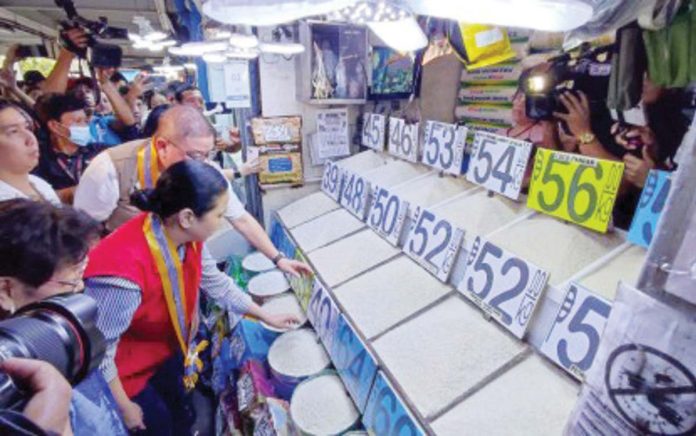
AGRICULTURE Secretary Francisco Tiu Laurel Jr. said the P58 per kilogram (kg) maximum suggested retail price (MSRP) on imported rice is just an initial level and may drop to as low as P50/kg in March depending on world rice prices.
The MSRP, which aims to prevent profiteering and address spiking retail rice prices, will be imposed on Jan. 20 in Metro Manila.
In an ambush interview at the sidelines of the joint market inspection with the Department of Trade and Industry (DTI) yesterday, Jan. 16, Tiu Laurel clarified that the MSRP will be subject to a regular review and adjustment to protect the welfare of both consumers and those in the entire value chain.
“Ang target natin sa MSRP, umpisa lang iyong P58, hindi iyan nakapako. So, basically after two to three weeks, balak kong maging P55 na lang iyan. After two weeks, maybe maging P52 na lang iyan,” Tiu Laurel said.
He added: “Kung bababa ang world prices, pwedeng maging P50 na lang iyan soon. So, iyan ang intensyon.”
The adjustment period will provide time for importers and retailers to “renegotiate” their terms and contracts with the entire value chain, he said.
The DA earlier projected a lower MSRP due to declining global prices, particularly for Vietnamese rice.
The 5 percent broken Vietnam rice dropped to USD434 per metric ton (MT) from USD510/MT on Dec. 10, 2024; 25 percent broken, USD409/MT from USD454/MT, and 100 percent broken, at USD326 from USD383, according to the Vietnam Food Association data.
“Sabi ko sa mga nag-kuwestiyon na P10 inumpisahan dahil kasi iyan ang ni-request. Give them time to negotiate with the whole value chain, but eventually, that would go down to P8 by March,” Tiu Laurel said.
The DA chief made the statements after some legislators and groups said the profit margin under the MSRP is relatively high considering the low landed cost of imported rice.
To date, the price of imported and local regular and well-milled rice ranges from P37/kg to P53/kg in Metro Manila; while imported and local premium and special rice range from P48/kg to P65/kg, according to the DA Bantay-Presyo (price watch).
Tiu Laurel, meanwhile, said the implementation of MSRP would also entail the use of rice labels in retail stores, which should indicate country of origin or province for local; as well as type, percent broken, and names of importer or miller. (PNA)







